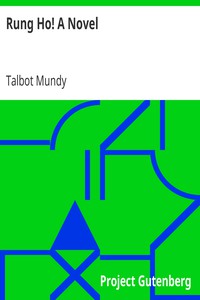Rung Ho! A Novel, Talbot Mundy [free ebook reader for ipad .txt] 📗

- Author: Talbot Mundy
Book online «Rung Ho! A Novel, Talbot Mundy [free ebook reader for ipad .txt] 📗». Author Talbot Mundy
“The scorpions, sahib—”
“Would you be pleased, Mahommed Gunga, if I entered your house with my hat on and without knocking or without permission?”
“Sahib, I—”
“Be good enough to have that brute's carcass dragged out and skinned, and—ah—leave me to sleep, will you?”
Mahommed Gunga bowed, and growled an order; another man passed the order on, and the tom-tom thundering began again as a dozen villagers pattered in to take away the tiger.
“Tell them, please,” commanded Cunningham, “that that racket is to cease. I want to sleep.”
Again Mahommed Gunga bowed, without a smile or a tremor on his face; again a growled order was echoed and re-echoed through the dark. The drumming stopped.
“Is there oil in the bahadur's lamp?” asked Mahommed Gunga.
“Probably not,” said Cunningham.
“I will command that—”
“You needn't trouble, thank you, risaldar-sahib. I sleep better in the dark. I'll be glad to see you after breakfast as usual—ah—without your shoes, unless you come in uniform. Good night.”
The Rajput signed to the others and withdrew with dignity. Cunningham reloaded his rifle in the dark and lay down. Within five minutes the swinging of the punka and the squeaking of the rope resumed, but regularly this time; Mahommed Gunga had apparently unearthed a man who understood the business. Reaction, the intermittent coolth, as the mat fan swung above his face, the steady, evenly timed squeak and movement—not least, the calm of well-asserted dignity—all joined to have one way, and Chota-Cunnigan-bahadur slept, to dream of fire-eyed tigers dancing on tombstones laid on the roof of hell, and of a grandfather in full general's uniform, who said: “Well done, bahadur!”
But outside, by a remade camp-fire, Mahommed Gunga sat and chuckled to himself, and every now and then grew eloquent to the bearded men who sat beside him.
“Aie! Did you hear him reprimand me? By the beard of God's prophet, that is a man of men! So was his father! Now I will tell Alwa and the others that I bring a man to them! By the teeth of God and my own honor I will swear to it! His first tiger—he had never seen a tiger!—in the dark, and unexpected—caught by it, to all seeming, like a trapped man in a cage—no lamp—no help at hand, or so he thought until it was all over. And he ran at the tiger! And then, 'you come with your shoes on, Mahommed Gunga—why, forsooth?' Did you hear him? By the blood of Allah, we have a man to lead us!”
CHAPTER VIII Now, the gist of the thing is—Be silent. Be calm. Be awake. Be on hand on the day. Be instant to heed the first note of alarm. And—precisely—exactly—Obey.
AT Howrah, while Mahommed Gunga was employing each chance circumstance to test the pluck and decision and reliability of Cunningham at almost every resting-place along the Grand Trunk Road, the armed squire he had left behind with a little handful of gold mohurs and three horses was finding time heavy on his hands.
Like his master, Ali Partab was a man of action, to whom the purlieus of a caravansary were well enough on rare occasions. He could ruffle it with the best of them; like any of his race, he could lounge with dignity and listen to the tales that hum wherever many horsemen congregate; and he was no mean raconteur—he had a tale or two to tell himself, of women and the chase and of the laugh that he, too, had flung in the teeth of fear when opportunity arose.
But each new story of the paid taletellers, who squat and drone and reach a climax, and then pass the begging bowl before they finish it—each merrily related jest brought in by members of the constantly arriving trading parties—each neigh of his three chargers—every new phase of the kaleidoscopic life he watched stirred new ambition in him to be up, and away, and doing. Many a dozen times he had to remind himself that “there had been a trust imposed.”
He exercised the horses daily, riding each in turn until he was as lean and lithe and hard beneath the skin as they were. They were Mahommed Gunga's horses—he Mahommed Gunga's man; therefore, his honor was involved. He reasoned, when he took the trouble to, along the good clean feudal line that lays down clearly what service is: there is no honor, says that argument, in serving any one who is content with half a service, and the honor is the only thing that counts.
As day succeeded ever sultrier, ever longer-drawn-out day—as each night came that saw him peg the horses out wherever what little breezes moved might fan them—as he sat among the courtyard groups and listened in the heavy heat, the fact grew more apparent to him that this trust of his was something after all which a man of worth might shoulder proudly. There was danger in it.
The talk among the traders—darkly hinted, most of it, and couched in metaphor—was all of blood, and what would follow on the letting of it. Now and then a loud-mouthed boaster would throw caution to the winds and speak openly of a grim day coming for the British; he would be checked instantly by wiser men, but not before Ali Partab had heard enough to add to his private store of information.
Priests came from a dozen cities to the eastward, all nominally after pilgrims for the sacred places, but all strangely indifferent to their quest. They preferred, it would seem, to sit in rings with chance-met ruffians—with believers and unbelievers alike—even with men of no caste at all—and talk of other things than pilgrimages.
“Next year, one hundred years ago the English conquered India. Remember ye the prophecy? One hundred years they had! This, then, is the last year. Whom the gods would whelm they first deprive of reason; mark ye this! The cartridges they serve out to the sepoys now are smeared with the blended fat of cows and pigs. Knowing that we Hindoos hold the cow a sacred beast, they do this sacrilege—and why? They would make us bite the cartridges and lose our caste. And why again? Because they would make us Christians! That is the truth! Else why are the Christian missionaries here in Howrah?”
The listeners would nod while the little red fires glowed and purred above the pipes, and others not included in the circle strained forward through the dark to listen.
“The gods get ready now! Are ye ready?”
Elsewhere, a hadji—green-turbaned from the pilgrimage to Mecca—would hold out to a throng of true believers.
“Ay! Pig's fat on the cartridges! The new drill is that the sepoy bites the cartridge first, to spill a little powder and make priming. Which true believer wishes to defile himself with pig's fat? Why do they this? Why are the Christian missionaries here? Ask both riddles with one breath, for both two





Comments (0)